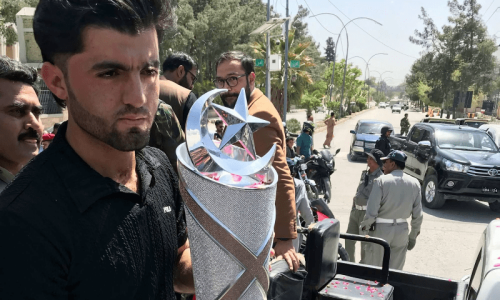• Beijing asks alliance to stop ‘provoking rivalry’
• Erdogan warns against Nato-Russia conflict
WASHINGTON: Nato leaders on Thursday looked to bolster ties with Asian partners after slamming China as a “decisive enabler” of Russia’s war, before holding talks with Ukraine’s President Volodymyr Zelensky at the end of a summit in Washington.
The 32-nation alliance has used the pomp-filled set piece in the US capital to showcase its resolve against Moscow and backing for Kyiv.
The three-day gathering has been overshadowed by political uncertainty in the United States as President Joe Biden fights for his own political survival.
After spending the bulk of the summit focused on bolstering Ukraine, Nato shifted attention eastwards by welcoming the leaders of Australia, Japan, New Zealand and South Korea.
A strongly-worded declaration from Nato released Wednesday called Beijing a “decisive enabler of Russia’s war against Ukraine” through its supplies of dual-use goods such as microchips that can help Moscow’s military.
China “cannot enable the largest war in Europe in recent history without this negatively impacting its interests and reputation,” Nato leaders said.
China hit back with a spokesperson for Beijing’s mission to the European Union saying: “Nato should stop hyping up the so-called China threat and provoking confrontation and rivalry, and do more to contribute to world peace and stability.”
“We urge Nato to reflect on the root causes of the crisis and its own actions, listen carefully to the just voice of the international community, and take concrete actions to ease the situation, instead of shifting the blame to others.”
Similarly, Turkish President Recep Tayyip Erdogan said on Thursday that any possibility of a direct confrontation between Russia and Nato was “worrying”, the official Anadolu news agency reported.
Erdogan’s comments came as Kremlin spokesman Dmitry Peskov said Russia was planning “response measures” to contain the “very serious threat” from the alliance.
“The possibility of a direct conflict between Nato and Russia is undoubtedly worrying,” said Erdogan, who is in Washington for the Nato summit. “Any steps that could lead to this outcome should be consciously avoided.”
China has refused to condemn Russia’s invasion and last year released a paper calling for a “political settlement” to the conflict, which Western countries said could enable Russia to retain much of the territory it has seized in Ukraine.
China presents itself as a neutral party in the conflict, but it has however offered a critical lifeline to Russia’s isolated economy, with trade booming since the conflict began.
The United States has been pushing its European allies for years to pay closer attention to the challenges posed by China.
Published in Dawn, July 12th, 2024















































